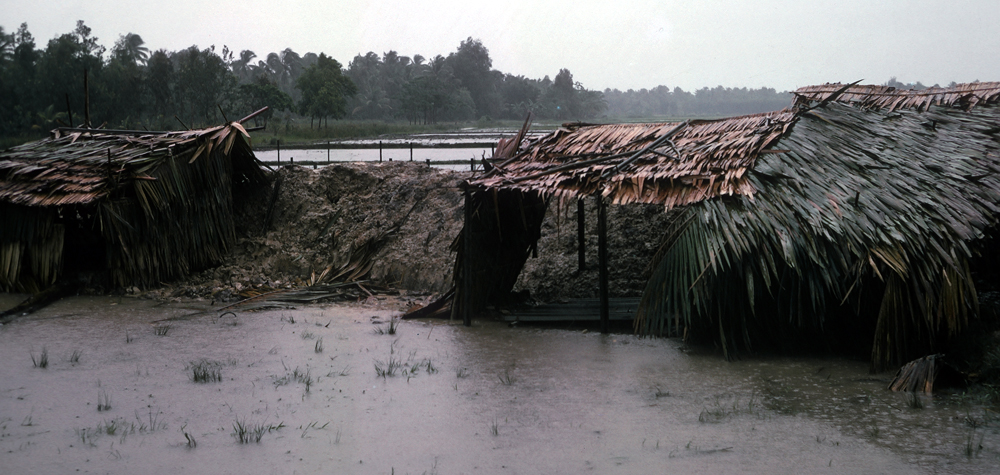Chapter 6
'Nasty'
JULY 29, 1969
Diary Entry:
Operation to south with 379. Sporadic sniper fire produced four friendly casualties. Hogan and I burned a VC house. We headed south toward Nha Sĩ again, single-file down the trail that runs along the banks of the Duòng Xuòng canal.
The purpose of the operation was to try to re-insert the 267 again, and this time, coax them into remaining there.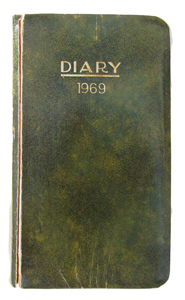
Our brave point man, Private Dzu, led the way, followed by the rest of the 1st Platoon and ourselves. Thiéu Úy Thuyet, Hogan, Binh, and I took up the middle of the column, our typical arrangement. I carried the PRC-25 portable radio on my back. The 267 Company, not thrilled about their battalion commander’s direct order to go into Nha Sĩ and stay there, was content to lag behind. They didn’t want anything to do with Nha Sĩ and had been procrastinating for days.
Before entering the hamlet, Thuyet decided to have Dzu head east first, crossing the Duòng Trâu Só canal, which brought the lead element into Nha Sĩ from the east. This provided an avenue of approach that was less likely to be anticipated by the Vietcông. After we forded the canal, I could see that point man Dzu came upon a clearing, an open rice paddy area approximately 100 meters across. Dzu held up the column and knelt down at the edge of the clearing. We came up to join him, and paused there, observing the other side for any signs of the enemy. Dzu was an excellent point man, patiently positioning himself there for many minutes, staring at the jungle for anything unusual. “I look for movement,” he hand-gestured.
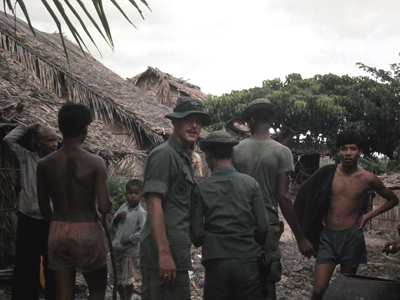 Satisfied that it looked benign enough, Thuyet dispatched our point man across the open area. I watched Dzu cross the open area alone and enter the woodline on the other side, as a squad of soldiers now entered the open area. A couple of them reached the other side. Hogan and I readied ourselves to move out.
Satisfied that it looked benign enough, Thuyet dispatched our point man across the open area. I watched Dzu cross the open area alone and enter the woodline on the other side, as a squad of soldiers now entered the open area. A couple of them reached the other side. Hogan and I readied ourselves to move out.
We stood up and immediately dropped back down as intense gunfire erupted on the other side. Some of the 1st Platoon, caught in the middle, came dashing back, while others, already committed, entered the woodline to take cover. One of our guys in the middle of the clearing was hit by rifle fire and dropped in a pile. He wasn’t moving, and I remember hoping his wound was minor; that he was just laying still to play dead and avoid more fire.
The gunfire on the other side picked up in intensity, but some of it was M16 fire. I remember hoping it was our guys returning fire and not those three VC running around with stolen M16s. Lieutenant Thuyet was now faced with the classic infantry dilemma. With a man down in the open and some of his men already in the woodline across the way, he couldn’t direct fire in there without fear of hitting his own men.
While he worked on a solution, I called up our outpost for a medivac request. Even though I couldn’t see the extent of the wounds, I knew I had at least one WIA already and the possibility of others. I could hear the two-way conversation to Kiến Binh as the guys in the outpost relayed the medivac request. This was followed by Kiến Binh’s conversation with Rạch Giá, of which I could only hear our side.
When we had been in Hóa Quản, we were fortunate to be close enough to Rạch Giá to have direct communication with them. Now, at Vĩnh Thanh, everything had to be relayed through Kiến Binh. And from my position in the field, calling from my portable PRC-25, my message was thrice removed. I listened to the radio operator in Kiến Binh authenticate to Rạch Giá that, indeed, this was a Vietnamese wounded in action, not U.S. The fire on the other side was subsiding as Thuyet directed two volunteers to go after the wounded man.
In combat units, ARVN units included, there exist individuals who volunteer for this sort of thing. To witness such an act of extreme courage is a remarkable remembrance. During my one-year tour of duty in the field, I saw it many times. I had seen it with the 168 rifle company at Hóa Quản and every man who volunteered to walk point on all of our patrols and night ambushes into dangerous areas.
Within that group who live by the sword, die by the sword, there are those that want to be recognized by their peers as the most daring of the daring. They want to face death unscathed and then live to brag about it. It’s a “man thing” among young men who daily face death at some level anyway, and they take it to a higher level to exhibit their courage to everyone. That level of courage can occasionally be born of a simpler, less complicated motive: a wounded buddy laying in the middle of an open rice paddy who needs to be saved. On that morning I witnessed it again, firsthand.
The volunteers ran out into the open and dragged the wounded 379 soldier back to our position. He was shot in the upper leg, with a grazing wound across his hand. The fire on the other side had stopped now and based on the lack of enemy fire drawn by the rescue, Thuyet sent out the rest of the platoon again. Most of them were entering the woodline as Hogan and I dashed across the clearing.
We entered the other side and were met by some of the 1st Platoon, who announced to me that we had two more wounded. We advanced forward and located the other two WIA’s, neither one of which was point man Dzu. The WIA’s had wounds that didn’t appear to be life threatening. I called the outpost and upped our medivac request to three WIA’s. Lt. Winters called Kiến Binh, Kiến Binh called Rạch Giá, Rạch Giá called Cần Thơ, etc. I left the wounded with the Vietnamese medics and moved forward with the others. No rifle fire now.
Ahead, in a small clearing, we came upon an uninhabited shelter, a lean-to, open on several sides. Thiéu Úy Thuyet’s attention was immediately drawn to the area surrounding the lean-to, as he barked to some of his men. He pointed around to the remains of a campfire, a make-shift bunker, and some kernels of white rice on the ground.
“Trung Úy,” Binh turned to me, “VC sleep here last night.”
“Have you seen Dzu,” Binh?”
“No,” he replied. I was wondering how he had fared, walking point when the gunfire erupted. Where could he be?
As we approached the edge of Nha Sĩ, we came upon the first of the inhabited houses near the Duòng Xuòng canal. The rest of the 1st Platoon had fanned out and secured the area around the house. There were soldiers crowded around the doorway of the house.
As I approached, I could see that a crowd had gathered inside the house as well. One of Thuyet’s men ran up to inform us that point man Dzu was inside. I translated the “bį thùòng” (wounded) part myself, as the private pointed to various parts of his body with his index finger.
Hogan and Binh were both sometimes squeamish about seeing the wounded, especially any of the soldiers they knew. It greatly upset them. Rather than enter the house, they parked themselves at the base of a coconut tree along the edge of the canal. I wasn’t particularly fond of dealing with it either. In fact, I was sick of it. I had already seen enough suffering, and the thoughts of them often kept me awake. I took off the heavy radio and left it with Hogan in the shade of the tree. I put down my M16 and ammo and asked him to keep an eye on it as well.
I was already catching the aroma of the Vietnamese cigarettes in the air, the sickeningly sweet synonym of death for me. There was always so much smoking immediately after a firefight, and my senses linked the aroma with the sight of the dead and dying. The nausea began to well up at the same time I inhaled the stink of the Vietnamese tobacco. My stomach had that same, queasy feeling again. I began sweating. Nervous, butterflies in the stomach-type sweating.
“Come on, Binh,” I said, as he reluctantly looked up into my eyes. I could tell he had the same feeling in his stomach. At the entrance to the house the crowd was so thick that at first, I couldn’t get in. When they realized it was Binh and I, the crowd parted, then filled back into the doorway. The smoke was thick in the room, and the sudden difference in light had us squinting to see anything but shapes. In the corner of the one-room house was a wooden-slatted Vietnamese bed, and I could make out the shape of a man on his back. As I approached, it was Dzu, his head propped up by a cylindrically shaped Vietnamese pillow. Thiéu Úy Thuyet was at his side, as was a Vietnamese medic. One of Dzu’s buddies was also next to him, holding a cigarette to his lips.
As my eyes adjusted in the dark smoky fog, I moved in close. Dzu recognized me and smiled, then defiantly took a drag on the cigarette. I had seen that sort of cavalier nonchalance before. Vietnamese smile when embarrassed. It was his way of dealing with the sight of me, or rather, me of him. It was his way of apologizing as if to say, “I'm embarrassed that you have to see me this way. I hope I’m not an inconvenience to you.” My eyes wandered the length of his body, which had been stripped to his shorts.
The extent of his wounds told me the Vietcông had been waiting for us on the other side of the clearing, or perhaps we had surprised them while having breakfast at the lean-to. Either way, they set up a hasty ambush and were ready for us. They waited until Dzu was almost upon them. Perhaps he even paused when he saw them, standing immediately to their front. When they fired, they shot him while he was fully erect. They shot to kill him instantly, to eliminate his threat completely, and thus concentrate their firepower on his friends 50 to 100 meters behind him. Dzu had taken the bullets meant for the rest of us.
I had never seen a man with that many gunshot wounds. Both of his arms were shot. One was broken, by the way it lay askew at his side. He had a sucking chest wound, which the medic was correctly addressing immediately. He had several more bullet holes in the midsection and a few more in his thighs. I remember the leg wounds to be peculiar. In dreams I can still see the leg shots; I stood closest to his legs. They looked like someone had taken a ball-point pen in their fist, and punched the pen into the flesh. The puncture wounds were hardly bleeding – just big, red welts. Of course, the medic was doing the best he could. Dzu had to be in immense pain; I couldn’t imagine the pain.
Thiéu Úy Thuyet was speaking to me, and Binh was translating: “Trung Úy, you can get medivac now?”
“I already have one coming,” I said. I turned and left the smoke-filled room. I had to get out. I was close to vomiting.
Out by the coconut tree, Hogan asked me how bad Dzu was. I knew he had a special, joking relationship with Dzu. Hogan liked him and sometimes shared his rations with him. Now I had to tell him the truth.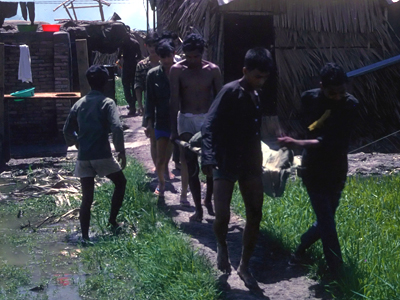
“He’s bad,” I said, reaching for the handset. Hogan stared at the ground in despair. It had already been a half-hour since I placed the medivac request. Maybe it was on the way.
“Foxtrot one-one this is Foxtrot one-zero, over.” I wanted Bob Winters to push the system, accelerate the process. Lieutenant Winters again made the call, adding a fourth wounded, and stressed the urgency as well as I could have done, had I not been so far removed from those on the other end.
“Roger,” they told Winters, “be advised they’ll be at your location ASAP. Anything further, over?”
“Negative,” Bob replied, “out.”
A half-hour later, we received the same response. I sat in the shade of the coconut tree with Hogan, staring at the stagnant water in the muddy canal. Vietnamese privates began trying to bum Salems from me, and when I wouldn’t give them one, they expressed displeasure. “Binh, get these little bastards out of here. I don't need this crap right now."
After more minutes, Thiéu Úy Thuyet was at my feet again, ranting to Binh.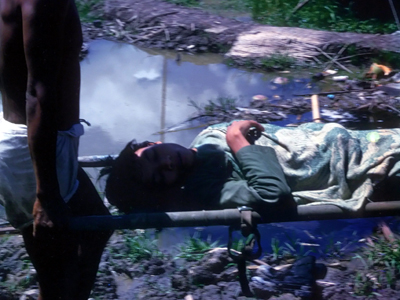
“Trung Úy, when helicopter come?” Binh asked for him.
“They told me soon. I’m so sorry. I’ll call again now, Binh,” I replied. After two hours, Thuyet was impatient, and I couldn’t blame him. I looked in on Dzu. He was no longer smiling. Most of the Vietnamese had left the room except for Dzu’s buddy and the company medic. I tried repeatedly to get the medivac, and we waited, and waited. I was disgusted.
Three hours from the time I first placed the medivac call, the ship finally arrived. I popped smoke and guided the ship in, and Hogan helped load the three wounded on board, plus the dead body of our brave point man, Dzu. It was the longest response time of any medivac I ever summoned. And the longest afternoon of my tour of duty.
“Hey, wait a minute,” the pilot yelled at me through the window, “the fourth one, is he dead?”
“No,” I lied. “Take him to the hospital.”
ALL RIGHTS RESERVED. COPYING, REPRODUCING, BORROWING OR USING ANY OF THE MATERIAL CONTAINED IN THIS WEBSITE AND/OR BOOK WITHOUT THE AUTHOR'S PERMISSION IS HEREBY STRICTLY PROHIBITED.
